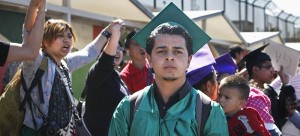
As tears swelled in their eyes and they fought back the emotions creeping in, Raquel and Alexis Cervantes couldn’t understand why their parents were sending them to the United States for high school after having just completed their secondary education in Baja California Sur, the second smallest state in Mexico. However, they knew it was for the best.
“That was a really hard time for us,” Raquel said. “Being 14 years old and leaving our parents behind to go to high school and live with a family friend in Chicago, in a whole new country with only one suitcase, we didn’t exactly feel prepared.”
Now 22 years old, the twin sisters are part of a global crisis of children migrating from their homelands in Latin America to the United States. According to a report conducted by the United States Customs and Border Protection sector of the U.S. Department of Homeland Security, more than 38,000 unaccompanied children under age 17 were apprehended at the U.S. border in 2013, and more than 55,000 have been apprehended since.
In addition, the Pew Research Center recorded that of the thousands of children fleeing Latin America, 16 percent were under age 12. Honduras, Guatemala, El Salvador and Mexico were among the top countries sending unaccompanied youths to the United States.
Elizabeth Martinez, a DePaul professor and director of the Center for Latino Research, sympathizes with these children as her family has personally experienced the trials and tribulations of immigrating and trying to find a sense of belonging in a foreign land.
“These children are not ‘illegals,’ they’re refugees who arrive at the border saying, ‘Here I am, help me,’” Martinez said. “They’re not sneaking across and hiding, I feel citizens of the U.S. are blind to the reality of what really happens at the border.”

According to the United Nation’s International Children’s Emergency Fund (UNICEF), the 1951 Refugee Convention and the 1967 Protocol placed standards on the way adult and children refugees are treated when entering a foreign land. Any child with a “well-founded fear of being persecuted” is considered a refugee. With that, children claiming refugee status cannot be forced to return to their country of origin and are ordered to receive the same handling in primary education and general treatment as any national citizen.
From fleeing violence, social injustice and gang activity, to striving for a better education and a healthy lifestyle for themselves and their families, immigrants have ventured to the United States for various reasons. Luckily for the Cervantes sisters, they fled for the opportunities awaiting them.
These two sisters have been shown the brighter side of immigration, which has allowed them to gain dual citizenship and travel back and forth between Mexico and the United States. They have also become college educated here in Chicago at DePaul University. The sisters are both double majoring in Art History and Architecture — something they would not have been able to study in Mexico — while also gaining a well-rounded understanding of their native country and the one that so closely borders it.
“We know a lot of people (who) fled horrendous situations. Thankfully for us, we were living comfortably, but our parents knew that the United States could provide us with the educational opportunities that Mexico couldn’t,” Alexis said.
While the Cervantes sisters’ father is entirely of Mexican decent, their mother was born and raised in Chicago after her parents, originally from Mexico, migrated to the United States for work and more opportunities. The sisters obtained dual citizenship right away, making their journey back and forth from the United States and their home in Mexico easier than most immigrants.
Mexico’s Organization for Economic Cooperation and Development recorded that in 2011, about 65 percent of 15 to 29-year-olds were not involved in any form of education, and 24.7 percent of people in that group were neither employed nor participating in educational training. However, the Cervantes sisters said that, although Mexico’s primary and secondary education may be lacking, their higher education is extremely competitive, just specialized.
“Coming to the United States gave me a chance to study what I was interested in when I came here to DePaul,” Alexis said. “We just didn’t have as many options in Mexico; it’s not that it was any worse, there were just more choices here.”
With the number of child immigrants from Latin America growing steadily, schools in major entry cities have experienced difficulties finding adequate space to accompany them and their educational needs. Most recently, National Public Radio featured the city of New Orleans and how it has seen a surge of child migrants coming to the city, forcing them to scramble to find enough funds to support them.
All too often immigrants are portrayed in the mass media in a negative and dehumanizing light. A report by the Migration Observatory at the University of Oxford concluded that immigrants were widely portrayed negatively through the use of terms such as ‘illegal’ and ‘alien’ being used to describe them. Despite negative portrayals, the Cervantes sisters have battled to undo that notion and embrace their Mexican heritage, while demonstrating how beneficial it is to have obtained dual citizenship.
“I feel freer here, I can identify as both Mexican and American,” Raquel said. “I think too often immigrants all get grouped into this category of being criminals and trying to take what Americans have, but people migrate for all kinds of reasons.”
Among all the violence and hardship stemming from Latin America, the Cervantes sisters have focused their attention on letting people know how much immigration has allowed them to grow and experience new things.
“When you think about it, the U.S. was founded by immigrants, and people shouldn’t be afraid of Mexicans and other Latin Americans coming to the United States,” Raquel said. “Just because they’re leaving their homes doesn’t mean that they’re bringing all of that with them across the border.”


DAII • Nov 10, 2014 at 3:48 pm
This author fails to point out that the correct English word for people who enter the U.S illegally is the word “Alien” which means without documentation. The word Immigrant means with documentation; legal migrants. The Central American children are not migrants they cross over the border illegally looking for parents or relatives that are in the country illegally. They are not refugee since poverty, a better life and job seeking is not a reason for asylum. What the author fails to understand is that the United States can not feed, house and educate every poor person south of the border. He also refuses to mention that the alien children do not have a right to be in the U.S nor drain our education, health care and other resources paid by Federal tax payer dollars. These resources should be used by citizens and legal migrants only. Simply the children must go back. The U.S has its own problems with gangs as experience in Chicago. The U.S does not have open borders; we legally allow 1 million migrants per year. We can not afford to absorb everyone who crosses our borders illegally. The Aliens state they are trying to flee crime yet the first thing they do is commit a crime crossing our border the author should at least right the facts and the truth that no one is entitle to break our laws and enter the country illegally and Latinos are not above our Immigration laws. The Citizens and legal migrants who pay taxes should have full use of those resources not people that have never paid taxes demanding a free education, free food , free housing and free medical care.